Unit 4 Exploring literature Grammar and usage 课件(共43张PPT)-2025-2026学年译林版(2019)必修第二册
文档属性
| 名称 | Unit 4 Exploring literature Grammar and usage 课件(共43张PPT)-2025-2026学年译林版(2019)必修第二册 | 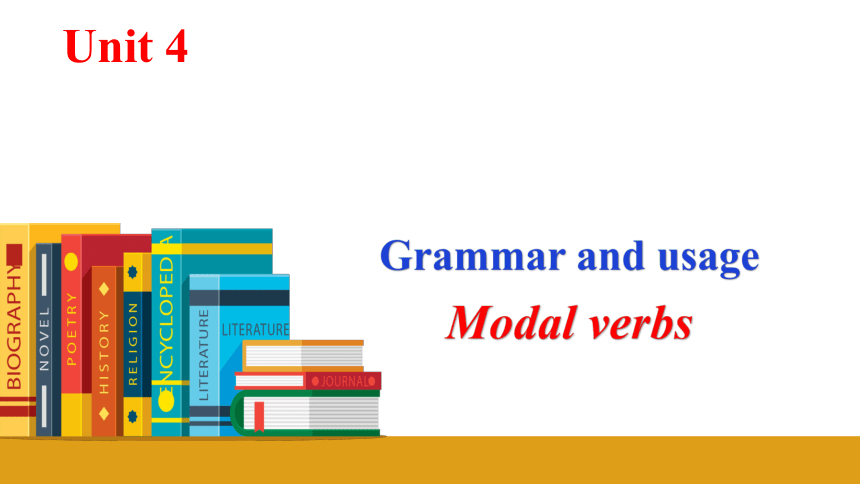 | |
| 格式 | pptx | ||
| 文件大小 | 22.3MB | ||
| 资源类型 | 教案 | ||
| 版本资源 | 牛津译林版(2019) | ||
| 科目 | 英语 | ||
| 更新时间 | 2025-06-22 22:40:19 | ||
图片预览

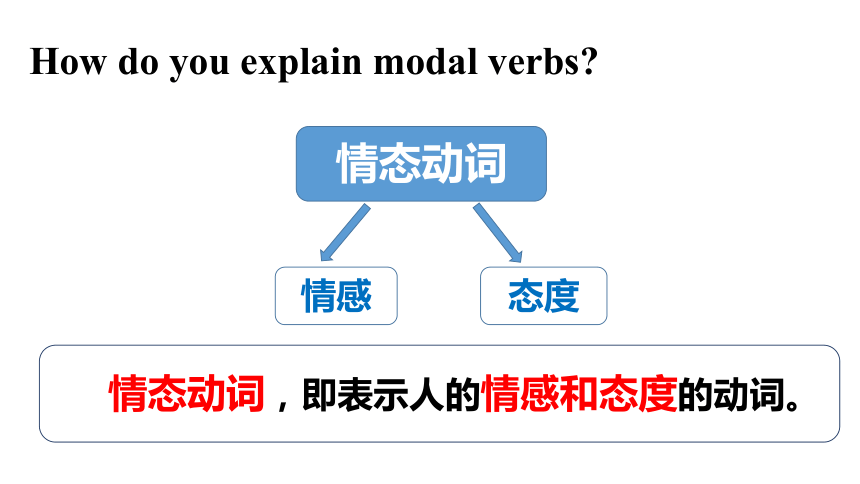
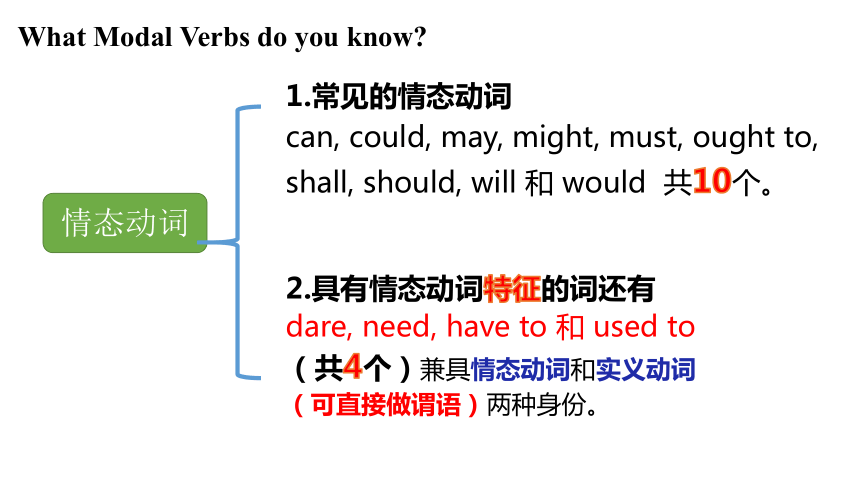
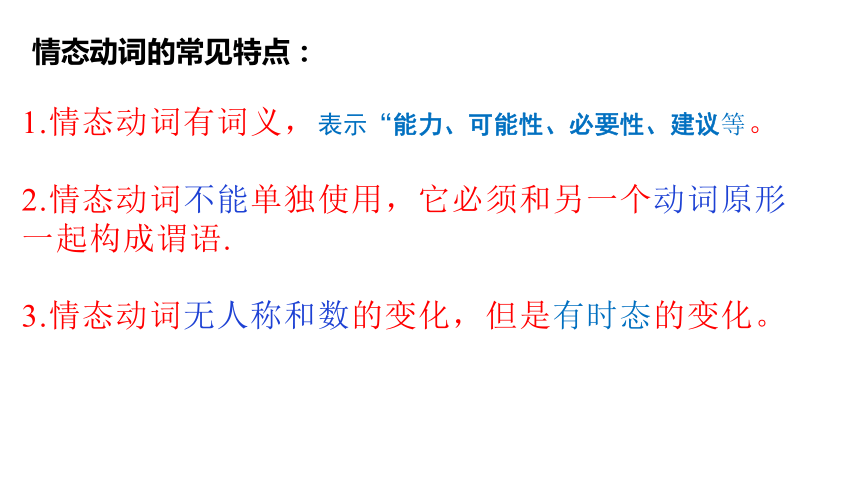
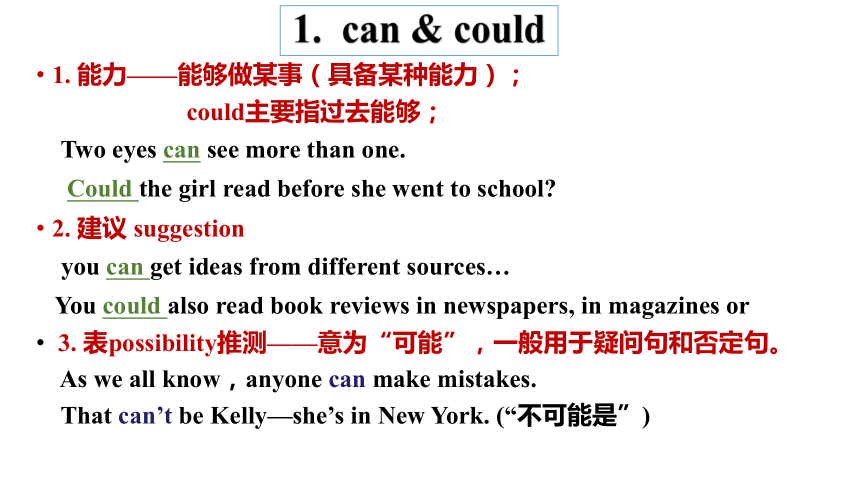

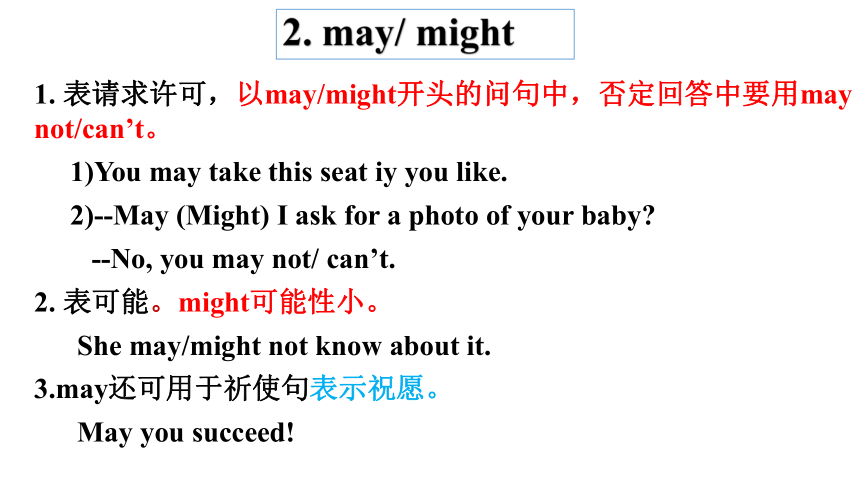
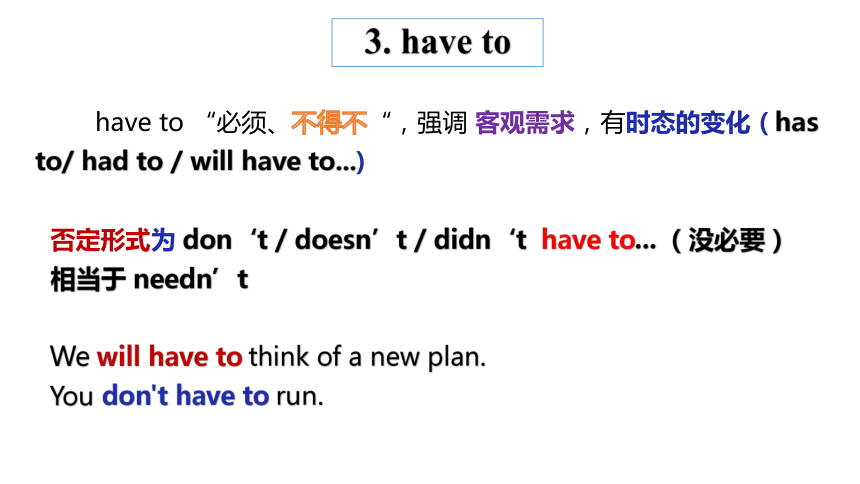
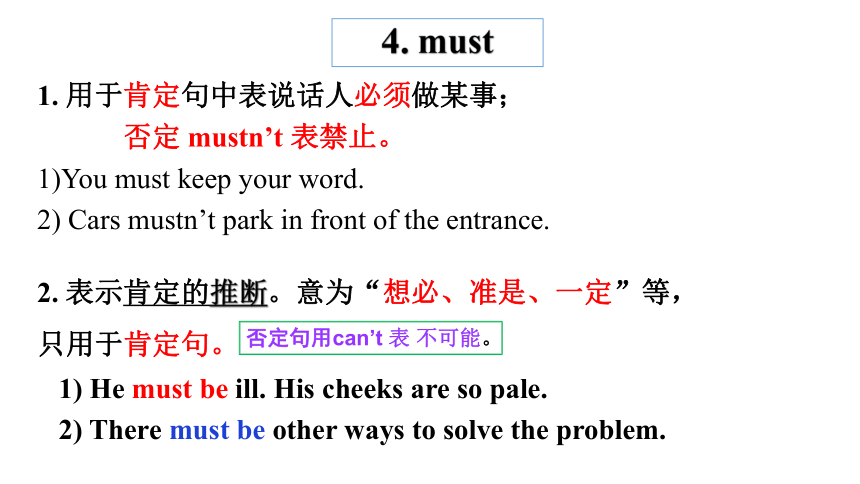
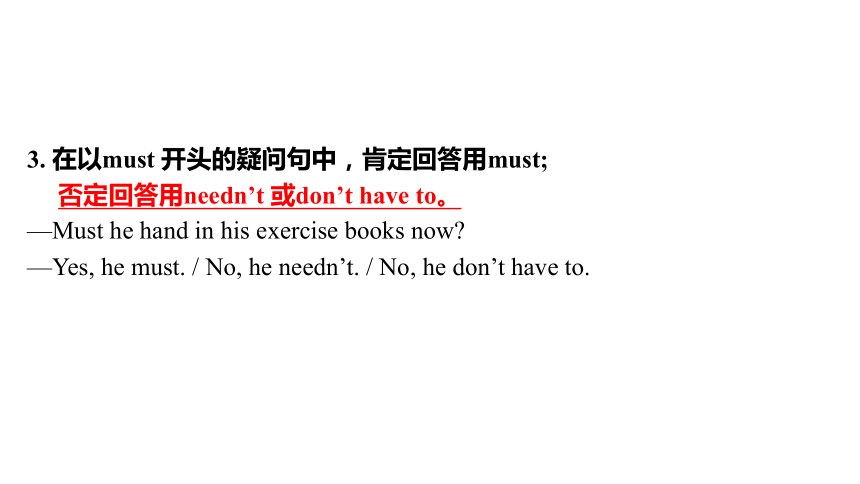
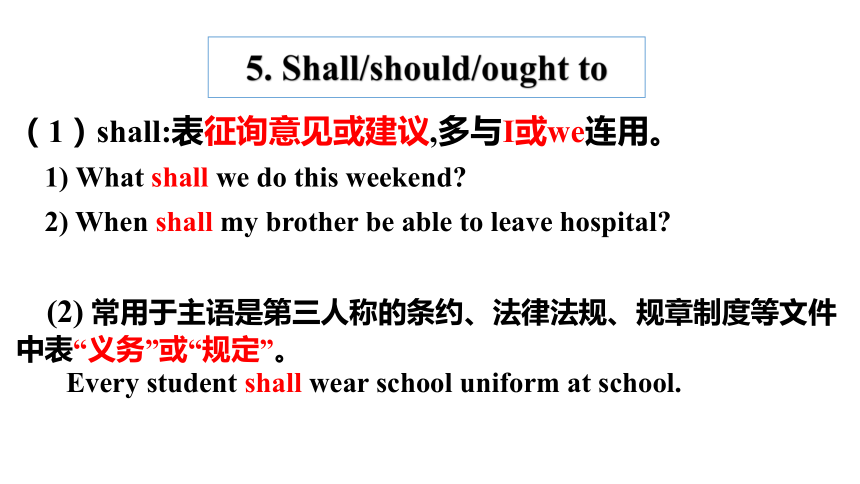
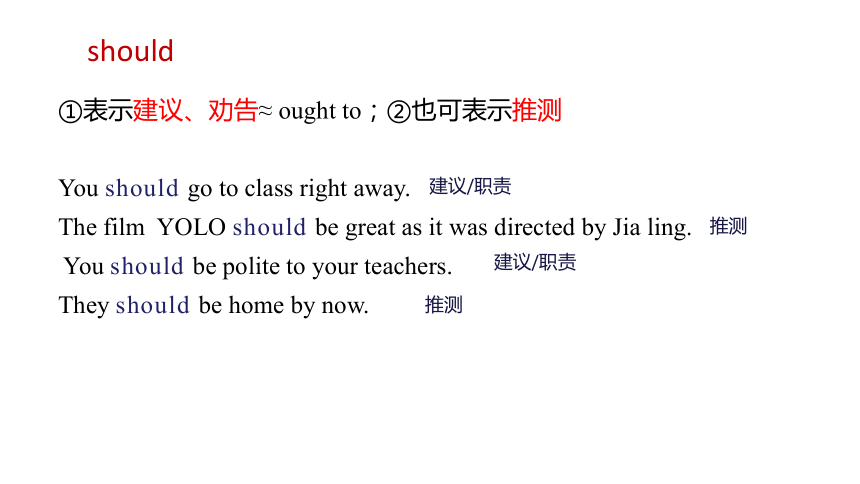
文档简介
(共43张PPT)
Unit 4
Grammar and usage
Modal verbs
How do you explain modal verbs
情态动词
情感
态度
情态动词,即表示人的情感和态度的动词。
情态动词
What Modal Verbs do you know
1.常见的情态动词
can, could, may, might, must, ought to, shall, should, will 和 would 共10个。
2.具有情态动词特征的词还有
dare, need, have to 和 used to
(共4个)兼具情态动词和实义动词
(可直接做谓语)两种身份。
情态动词的常见特点:
1.情态动词有词义,表示“能力、可能性、必要性、建议等。
2.情态动词不能单独使用,它必须和另一个动词原形一起构成谓语.
3.情态动词无人称和数的变化,但是有时态的变化。
1. 能力——能够做某事(具备某种能力);
could主要指过去能够;
Two eyes can see more than one.
Could the girl read before she went to school
2. 建议 suggestion
you can get ideas from different sources…
You could also read book reviews in newspapers, in magazines or
3. 表possibility推测——意为“可能”,一般用于疑问句和否定句。
As we all know,anyone can make mistakes.
That can’t be Kelly—she’s in New York. (“不可能是”)
1. can & could
4. could表示更委婉语气,征求许可,回答时只能用can;用于否定句中表不允许。
Could I have a look at your new pen
2. may/ might
1. 表请求许可,以may/might开头的问句中,否定回答中要用may not/can’t。
1)You may take this seat iy you like.
2)--May (Might) I ask for a photo of your baby
--No, you may not/ can’t.
2. 表可能。might可能性小。
She may/might not know about it.
3.may还可用于祈使句表示祝愿。
May you succeed!
have to “必须、不得不“,强调 客观需求,有时态的变化(has to/ had to / will have to...)
否定形式为 don‘t / doesn’t / didn‘t have to... (没必要)
相当于 needn’t
We will have to think of a new plan.
You don't have to run.
3. have to
4. must
1. 用于肯定句中表说话人必须做某事;
否定 mustn’t 表禁止。
1)You must keep your word.
2) Cars mustn’t park in front of the entrance.
2. 表示肯定的推断。意为“想必、准是、一定”等,
只用于肯定句。
1) He must be ill. His cheeks are so pale.
2) There must be other ways to solve the problem.
否定句用can’t 表 不可能。
3. 在以must 开头的疑问句中,肯定回答用must;
否定回答用needn’t 或don’t have to。
—Must he hand in his exercise books now
—Yes, he must. / No, he needn’t. / No, he don’t have to.
(1)shall:表征询意见或建议,多与I或we连用。
1) What shall we do this weekend
2) When shall my brother be able to leave hospital
(2) 常用于主语是第三人称的条约、法律法规、规章制度等文件中表“义务”或“规定”。
Every student shall wear school uniform at school.
5. Shall/should/ought to
①表示建议、劝告≈ ought to;②也可表示推测
You should go to class right away.
The film YOLO should be great as it was directed by Jia ling.
You should be polite to your teachers.
They should be home by now.
建议/职责
推测
建议/职责
推测
should
We ought to make a careful plan before we start the work.
① They ought to apologize.
② You are his brother so you ought to take care of him.
1. ought to: 应当;应该 ,意思接近于should,但ought to语气更强。
2. 表示建议或劝告。
3. 表示推测。
Henry ought to be there by now. He left home at six.
ought to/ ought not to
6. will & would
1. 表意愿,愿意...
I will do anything for you.
They said that they would fight for justice正义.
2. 表请求,用于疑问句
Will/Would you please take a message for me
3. 表习惯; 会...
He would spend hours on the telephone.
4.表推测,“想必”
This will be the house you are looking for.
用法 建议 suggestion 才能/能力 ability 义务/职责 necessity 可能/推测 possibility 请求/许可
request
can/could √ √ √ √
shall/should √ √ √ √
ought to √ √ √
will/would √ √
may/might √ √
must √ √
考点:表推测的情态动词
1. 对现在或客观事实的肯定推测
must:肯定
can/could:很可能
should:很可能/应该…, 指按常理、有依据的推测
may/might:也许, 大概;表把握不大的推测
—What are you doing this Saturday
—I’m not sure, but I _______ go to the cinema.
—Good morning. I’ve got an appointment with Smith.
—Hello. You ______ be Mrs. Peter.
might/may
must
2.对现在情况或客观事实的否定推测
can’t:不可能;推测的语气相当有把握
may(might) not:可能不,也许不,表不大有把握的推测
It can’t be the postman at the door. It’s only five o’clock.
The younger people might not like the idea.
练习: 选用括号内合适的内容补全下面句子。
1. I'm sorry I couldn't get in touch with him before he left. I __________________ (should have phoned, have phoned) him earlier.
2. Since they aren't answering their telephone, they ______________ (can have left, must have left).
3. You ____________ (will, may) lead a horse to the water but you _________ (dare, can) not make it drink.
4. Mary _____________________ (couldn't have received, needn't have received) my email; otherwise she would have replied before now.
5. You ____________ (mustn't, needn't) do that if you don't want to.
should have phoned
must have left
may
can
couldn't have received
needn't
6. I don't believe him. He ________ (may not, can't) be serious.
7. If you don't like to swim, you _______________ (may as well, may well) stay at home.
8. They hurried there only to find the meeting canceled. In fact, they __________________ (needn't have gone, wouldn't have gone) at all.
9. She was ill. She ______________________ (couldn't have attended, mustn't attend) the meeting here.
10. Carey didn't go to the party last night because she ________________ (should look after, had to look after) the baby for her sister until 9:30.
needn't have gone
couldn't have attended
had to look after
can't
may as well
Every body said “Read More books!”
but nobody tells me “what shall I read ”
Find sentences with modal verbs
Read the website article and complete the mind map.
To solve the problem of “what shall I read ”
Get ideas from ____________.
Develop your
___________.
Ask friends, parents, and teachers to ____________ books.
Read book _________
in newspapers, in magazines or online.
Look for books on _______ that interest you.
Look through the
__________ in library.
different sources
own taste
recommend
reviews
topics
collections
Find these Modal verbs words in the article of Part A
Suggestion
Ability
Necessity
Possibility
What shall I read
2.…you can get ideas from different sources…
5.You can also read book reviews in newspapers in magazines or online.
4.Teachers in particular can provide suggestions for interesting reading materials that can be found in the library or bookshop easily.
6.A book review can also tell you whether a book is worth reading or not.
3.…what books you ought to read.
8. However, you must also decide for yourself what kind of books to read.
9.You do not have to read a book just because everyone recommends it.
1.You might have asked yourself this question more than once.
7.These ideas should point you in the right direction.
10.…you may find yourself better able to seek out books to your taste…
a
b
c
d
e
f
Working out the rules
Model verbs can express ability or necessity. They can also make suggestions or describe the probability of an event. The same modal verb can have different functions.
Modal verbs can be followed by _____________.
You can choose more than one answer for the blank.
a do(the base form) d be done(the passive voice)
b doing(the verb-ing form) e be doing(the continuous form)
c did (the past form) f have done (the perfect form)
a, d, e, f
情态动词是一种本身有一定的词义,表示说话人的情绪,态度或语气的动词,但不能单独作谓语, 只能和其他动词原形构成谓语。
情态动词的几种形式
情态动词有进行式、完成式和被动式几种形式。其构成见下表。
形式 用法 例句
进行式(情态动词+be doing) 情态动词与主动词的进行式合用,表示某动作正在进行 Jack may be reading in the library.
杰克也许正在图书馆看书。
完成式(情态动词+have done) 情态动词与主动词的完成式合用,表示过去发生的动作
Tom must have arrived home by now.
现在汤姆肯定已经到家了。
被动式(情态动词+be done) 情态动词可以与主动词的被动式合用,表示被动 The road may be blocked.
公路也许被堵了。
情态动词+ have+ done的用法
must have done: 过去一定做过某事
can/could have done: 过去可能做过某事
can’t / couldn’t have done: 过去不可能做某事
may/might(not) have done: 过去可能(没)做过某事
1. 对过去情况的推测
1)From what you said,she must have told you all about it.
2)Tom could have finished the paper on his own.
4)You might have read about the news in the papers.
3)He couldn’t have done the research without your support.
1. Jim says we ______ stay in his house as long as we leave it clean and tidy.
A. must B. can C. need D. should
B
2. The professor warned the students that on no account _______ use mobile phones in his class.
A. should they B. they should
C. dare they D. they dare
A
3. I can’t find my purse. I ________ it in the supermarket yesterday, but I’m not sure.
A. should leave B. must have left
C. might leave D. could have left
D
链接高考
易 错 防 范
典例1 John,look at the time. ________ you play the piano at such a late hour
易错警示:此题易误填need。解题时要注意语境,体会语气。
答案:Must 句意:约翰,看看时间。这么晚了你偏要弹钢琴吗?从说话人的语气判断,含有不满之意。must在此表示特定的语气和态度,意为“偏要,硬要”。
Phrases
1.不止一次
2.首先
3.特别;尤其
4.值得做某事
5.浏览
6.有可能做...
7.偶然发现
8.慢慢地
9.物色到;挑选出
10.更加
1.more than once
2.to start/begin with
3.in particular
4.be worth doing
5.look through
6.be likely to do
7.come across
8.over time
9.seek out
10.all the more
Applying the rules P49
B1 For the following groups of three sentences, tick the sentence which uses the modal verb differently from the other two.
a Can I keep the book for more than two weeks
b Nick can read more in an afternoon than I can in a week!
c Can Mary finish War and Peace in a month
a I am afraid I may be unable to finish this novel today.
b It may be difficult for people to agree on what good literature is.
c You may go to the library tomorrow afternoon, if you have time.
√
√
request
ability
ability
possibility
possibility
suggestion
Applying the rules
B1 For the following groups of three sentences, tick the sentence which uses the modal verb differently from the other two.
a I must finish writing the book review and hand it in before Wednesday.
b You must be tired after three hours’ reading.
c Students must develop the habit of reading classic literature.
a Henry should be reading books in the library.
b I have fifty dollars—that should be enough for three books.
c Reading English novels has greatly increased my vocabulary — you should try it too.
√
√
necessity
possibility
necessity
possibility
possibility
suggestion
B2
When my English teacher suggested that I read Charles Dickens’s A Christmas Carol, I thought, “I (1) (can’t/shouldn’t) read this! It (2) (has to/must) be very boring.” Surprisingly, it turned out the exact opposite. I (3) (could/might) not stop turning the pages!
The book’s main character is Scrooge, a rich but mean old man. He hates all kinds of celebrations. On Christmas eve, he is transported to different points in his life by three spirits. In the end, he reflects on these moments and realizes his mistakes. Then he decides that he (4) (might/must) change himself.
can’t
must
could
must
On Christmas morning, he sends a large turkey to a poor man for Christmas dinner. He also tries to make his family and friends happy by spending time with them.
There is something that (5) (can/must) be learnt from A Christmas Carol: we (6) (should/may) treat others with kindness, generosity and love. I think everyone (7) (would/ought to) read this book.
can
should
ought to
I. 选择填空。
1. Robert is good at languages and_______ (can/must)
speak four languages.
2. The meeting is very important and you ___________
(would/should) attend it on schedule.
3. I managed to find the street, but I____________
(couldn't/mustn't) find her house.
4. When the girl was five years old, she _________
(might/could) skate very well.
5. Every Sunday afternoon, the boy______(will/may) sit
there hour after hour looking at the traffic go by.
can
should
couldn't
could
will
6. In his childhood, Jack__________(would/could) be
nervous when he met strangers.
7. If you earn more than 5,000 yuan per month, you ______(have to/can) pay tax (税).
8. According to the doctor's advice, the medicine
__________(might/must) be taken three times a day.
9. Rose _______(can't/needn't) be in the classroom
now, because I saw her leave school several
minutes ago.
10. You_________(ought to/will) give up smoking. It
does no good to your health.
would
have to
must
can't
ought to
II. 根据所给汉语提示完成下列句子, 每空
一词。
你哥哥不可能已经找到他的车,因为
今天早上他是坐公共汽车来上班的。
Your brother ______ _____ ______ his car, for
he came to work by bus this morning.
2. 约翰,你不许玩刀子,你会伤害自己的。
John, you ________ _____ with the knife,
or you __________ ______ yourself.
can’t
have
found
mustn’t
may/might
play
hurt
C Fill in the blanks with the correct forms of the verbs in the brackets, using the proper modal verbs. P76 (选作)
1.— What’s the weather like in your hometown Is it cold in winter
— Yes, it (be) as cold as -30℃ in winter.
2. — I want to invite Tom to see a film tonight. Has he arrived yet
— Yes, he just arrived. But after four hours’ ride, he ______________ (be) tired now and he (prefer) to stay in tonight.
3. — Is Betty still playing the piano
— Yes. I asked her to stop and take a rest, but she______________ (not listen).
can be
must/may/might be
wouldn’t listen
may/might prefer
C Fill in the blanks with the correct forms of the verbs in the brackets, using the proper modal verbs. P76
4.—What does the rule say about using the reading room
— No one (talk) loudly.
5.— Your car looks great. It (cost) you a lot of money.
— Yes, it’s quite expensive.
6.— How long can I keep the book
— The books that students borrow (return) to the library within two weeks.
shall/should talk
must have cost
must/shall be returned
1. Summarize the different functions of the following modal verbs: can, must, should, may, might and shall.
2. Write a paragraph on the book you would like to recommend most with at least five sentences, using proper modal verbs.
Unit 4
Grammar and usage
Modal verbs
How do you explain modal verbs
情态动词
情感
态度
情态动词,即表示人的情感和态度的动词。
情态动词
What Modal Verbs do you know
1.常见的情态动词
can, could, may, might, must, ought to, shall, should, will 和 would 共10个。
2.具有情态动词特征的词还有
dare, need, have to 和 used to
(共4个)兼具情态动词和实义动词
(可直接做谓语)两种身份。
情态动词的常见特点:
1.情态动词有词义,表示“能力、可能性、必要性、建议等。
2.情态动词不能单独使用,它必须和另一个动词原形一起构成谓语.
3.情态动词无人称和数的变化,但是有时态的变化。
1. 能力——能够做某事(具备某种能力);
could主要指过去能够;
Two eyes can see more than one.
Could the girl read before she went to school
2. 建议 suggestion
you can get ideas from different sources…
You could also read book reviews in newspapers, in magazines or
3. 表possibility推测——意为“可能”,一般用于疑问句和否定句。
As we all know,anyone can make mistakes.
That can’t be Kelly—she’s in New York. (“不可能是”)
1. can & could
4. could表示更委婉语气,征求许可,回答时只能用can;用于否定句中表不允许。
Could I have a look at your new pen
2. may/ might
1. 表请求许可,以may/might开头的问句中,否定回答中要用may not/can’t。
1)You may take this seat iy you like.
2)--May (Might) I ask for a photo of your baby
--No, you may not/ can’t.
2. 表可能。might可能性小。
She may/might not know about it.
3.may还可用于祈使句表示祝愿。
May you succeed!
have to “必须、不得不“,强调 客观需求,有时态的变化(has to/ had to / will have to...)
否定形式为 don‘t / doesn’t / didn‘t have to... (没必要)
相当于 needn’t
We will have to think of a new plan.
You don't have to run.
3. have to
4. must
1. 用于肯定句中表说话人必须做某事;
否定 mustn’t 表禁止。
1)You must keep your word.
2) Cars mustn’t park in front of the entrance.
2. 表示肯定的推断。意为“想必、准是、一定”等,
只用于肯定句。
1) He must be ill. His cheeks are so pale.
2) There must be other ways to solve the problem.
否定句用can’t 表 不可能。
3. 在以must 开头的疑问句中,肯定回答用must;
否定回答用needn’t 或don’t have to。
—Must he hand in his exercise books now
—Yes, he must. / No, he needn’t. / No, he don’t have to.
(1)shall:表征询意见或建议,多与I或we连用。
1) What shall we do this weekend
2) When shall my brother be able to leave hospital
(2) 常用于主语是第三人称的条约、法律法规、规章制度等文件中表“义务”或“规定”。
Every student shall wear school uniform at school.
5. Shall/should/ought to
①表示建议、劝告≈ ought to;②也可表示推测
You should go to class right away.
The film YOLO should be great as it was directed by Jia ling.
You should be polite to your teachers.
They should be home by now.
建议/职责
推测
建议/职责
推测
should
We ought to make a careful plan before we start the work.
① They ought to apologize.
② You are his brother so you ought to take care of him.
1. ought to: 应当;应该 ,意思接近于should,但ought to语气更强。
2. 表示建议或劝告。
3. 表示推测。
Henry ought to be there by now. He left home at six.
ought to/ ought not to
6. will & would
1. 表意愿,愿意...
I will do anything for you.
They said that they would fight for justice正义.
2. 表请求,用于疑问句
Will/Would you please take a message for me
3. 表习惯; 会...
He would spend hours on the telephone.
4.表推测,“想必”
This will be the house you are looking for.
用法 建议 suggestion 才能/能力 ability 义务/职责 necessity 可能/推测 possibility 请求/许可
request
can/could √ √ √ √
shall/should √ √ √ √
ought to √ √ √
will/would √ √
may/might √ √
must √ √
考点:表推测的情态动词
1. 对现在或客观事实的肯定推测
must:肯定
can/could:很可能
should:很可能/应该…, 指按常理、有依据的推测
may/might:也许, 大概;表把握不大的推测
—What are you doing this Saturday
—I’m not sure, but I _______ go to the cinema.
—Good morning. I’ve got an appointment with Smith.
—Hello. You ______ be Mrs. Peter.
might/may
must
2.对现在情况或客观事实的否定推测
can’t:不可能;推测的语气相当有把握
may(might) not:可能不,也许不,表不大有把握的推测
It can’t be the postman at the door. It’s only five o’clock.
The younger people might not like the idea.
练习: 选用括号内合适的内容补全下面句子。
1. I'm sorry I couldn't get in touch with him before he left. I __________________ (should have phoned, have phoned) him earlier.
2. Since they aren't answering their telephone, they ______________ (can have left, must have left).
3. You ____________ (will, may) lead a horse to the water but you _________ (dare, can) not make it drink.
4. Mary _____________________ (couldn't have received, needn't have received) my email; otherwise she would have replied before now.
5. You ____________ (mustn't, needn't) do that if you don't want to.
should have phoned
must have left
may
can
couldn't have received
needn't
6. I don't believe him. He ________ (may not, can't) be serious.
7. If you don't like to swim, you _______________ (may as well, may well) stay at home.
8. They hurried there only to find the meeting canceled. In fact, they __________________ (needn't have gone, wouldn't have gone) at all.
9. She was ill. She ______________________ (couldn't have attended, mustn't attend) the meeting here.
10. Carey didn't go to the party last night because she ________________ (should look after, had to look after) the baby for her sister until 9:30.
needn't have gone
couldn't have attended
had to look after
can't
may as well
Every body said “Read More books!”
but nobody tells me “what shall I read ”
Find sentences with modal verbs
Read the website article and complete the mind map.
To solve the problem of “what shall I read ”
Get ideas from ____________.
Develop your
___________.
Ask friends, parents, and teachers to ____________ books.
Read book _________
in newspapers, in magazines or online.
Look for books on _______ that interest you.
Look through the
__________ in library.
different sources
own taste
recommend
reviews
topics
collections
Find these Modal verbs words in the article of Part A
Suggestion
Ability
Necessity
Possibility
What shall I read
2.…you can get ideas from different sources…
5.You can also read book reviews in newspapers in magazines or online.
4.Teachers in particular can provide suggestions for interesting reading materials that can be found in the library or bookshop easily.
6.A book review can also tell you whether a book is worth reading or not.
3.…what books you ought to read.
8. However, you must also decide for yourself what kind of books to read.
9.You do not have to read a book just because everyone recommends it.
1.You might have asked yourself this question more than once.
7.These ideas should point you in the right direction.
10.…you may find yourself better able to seek out books to your taste…
a
b
c
d
e
f
Working out the rules
Model verbs can express ability or necessity. They can also make suggestions or describe the probability of an event. The same modal verb can have different functions.
Modal verbs can be followed by _____________.
You can choose more than one answer for the blank.
a do(the base form) d be done(the passive voice)
b doing(the verb-ing form) e be doing(the continuous form)
c did (the past form) f have done (the perfect form)
a, d, e, f
情态动词是一种本身有一定的词义,表示说话人的情绪,态度或语气的动词,但不能单独作谓语, 只能和其他动词原形构成谓语。
情态动词的几种形式
情态动词有进行式、完成式和被动式几种形式。其构成见下表。
形式 用法 例句
进行式(情态动词+be doing) 情态动词与主动词的进行式合用,表示某动作正在进行 Jack may be reading in the library.
杰克也许正在图书馆看书。
完成式(情态动词+have done) 情态动词与主动词的完成式合用,表示过去发生的动作
Tom must have arrived home by now.
现在汤姆肯定已经到家了。
被动式(情态动词+be done) 情态动词可以与主动词的被动式合用,表示被动 The road may be blocked.
公路也许被堵了。
情态动词+ have+ done的用法
must have done: 过去一定做过某事
can/could have done: 过去可能做过某事
can’t / couldn’t have done: 过去不可能做某事
may/might(not) have done: 过去可能(没)做过某事
1. 对过去情况的推测
1)From what you said,she must have told you all about it.
2)Tom could have finished the paper on his own.
4)You might have read about the news in the papers.
3)He couldn’t have done the research without your support.
1. Jim says we ______ stay in his house as long as we leave it clean and tidy.
A. must B. can C. need D. should
B
2. The professor warned the students that on no account _______ use mobile phones in his class.
A. should they B. they should
C. dare they D. they dare
A
3. I can’t find my purse. I ________ it in the supermarket yesterday, but I’m not sure.
A. should leave B. must have left
C. might leave D. could have left
D
链接高考
易 错 防 范
典例1 John,look at the time. ________ you play the piano at such a late hour
易错警示:此题易误填need。解题时要注意语境,体会语气。
答案:Must 句意:约翰,看看时间。这么晚了你偏要弹钢琴吗?从说话人的语气判断,含有不满之意。must在此表示特定的语气和态度,意为“偏要,硬要”。
Phrases
1.不止一次
2.首先
3.特别;尤其
4.值得做某事
5.浏览
6.有可能做...
7.偶然发现
8.慢慢地
9.物色到;挑选出
10.更加
1.more than once
2.to start/begin with
3.in particular
4.be worth doing
5.look through
6.be likely to do
7.come across
8.over time
9.seek out
10.all the more
Applying the rules P49
B1 For the following groups of three sentences, tick the sentence which uses the modal verb differently from the other two.
a Can I keep the book for more than two weeks
b Nick can read more in an afternoon than I can in a week!
c Can Mary finish War and Peace in a month
a I am afraid I may be unable to finish this novel today.
b It may be difficult for people to agree on what good literature is.
c You may go to the library tomorrow afternoon, if you have time.
√
√
request
ability
ability
possibility
possibility
suggestion
Applying the rules
B1 For the following groups of three sentences, tick the sentence which uses the modal verb differently from the other two.
a I must finish writing the book review and hand it in before Wednesday.
b You must be tired after three hours’ reading.
c Students must develop the habit of reading classic literature.
a Henry should be reading books in the library.
b I have fifty dollars—that should be enough for three books.
c Reading English novels has greatly increased my vocabulary — you should try it too.
√
√
necessity
possibility
necessity
possibility
possibility
suggestion
B2
When my English teacher suggested that I read Charles Dickens’s A Christmas Carol, I thought, “I (1) (can’t/shouldn’t) read this! It (2) (has to/must) be very boring.” Surprisingly, it turned out the exact opposite. I (3) (could/might) not stop turning the pages!
The book’s main character is Scrooge, a rich but mean old man. He hates all kinds of celebrations. On Christmas eve, he is transported to different points in his life by three spirits. In the end, he reflects on these moments and realizes his mistakes. Then he decides that he (4) (might/must) change himself.
can’t
must
could
must
On Christmas morning, he sends a large turkey to a poor man for Christmas dinner. He also tries to make his family and friends happy by spending time with them.
There is something that (5) (can/must) be learnt from A Christmas Carol: we (6) (should/may) treat others with kindness, generosity and love. I think everyone (7) (would/ought to) read this book.
can
should
ought to
I. 选择填空。
1. Robert is good at languages and_______ (can/must)
speak four languages.
2. The meeting is very important and you ___________
(would/should) attend it on schedule.
3. I managed to find the street, but I____________
(couldn't/mustn't) find her house.
4. When the girl was five years old, she _________
(might/could) skate very well.
5. Every Sunday afternoon, the boy______(will/may) sit
there hour after hour looking at the traffic go by.
can
should
couldn't
could
will
6. In his childhood, Jack__________(would/could) be
nervous when he met strangers.
7. If you earn more than 5,000 yuan per month, you ______(have to/can) pay tax (税).
8. According to the doctor's advice, the medicine
__________(might/must) be taken three times a day.
9. Rose _______(can't/needn't) be in the classroom
now, because I saw her leave school several
minutes ago.
10. You_________(ought to/will) give up smoking. It
does no good to your health.
would
have to
must
can't
ought to
II. 根据所给汉语提示完成下列句子, 每空
一词。
你哥哥不可能已经找到他的车,因为
今天早上他是坐公共汽车来上班的。
Your brother ______ _____ ______ his car, for
he came to work by bus this morning.
2. 约翰,你不许玩刀子,你会伤害自己的。
John, you ________ _____ with the knife,
or you __________ ______ yourself.
can’t
have
found
mustn’t
may/might
play
hurt
C Fill in the blanks with the correct forms of the verbs in the brackets, using the proper modal verbs. P76 (选作)
1.— What’s the weather like in your hometown Is it cold in winter
— Yes, it (be) as cold as -30℃ in winter.
2. — I want to invite Tom to see a film tonight. Has he arrived yet
— Yes, he just arrived. But after four hours’ ride, he ______________ (be) tired now and he (prefer) to stay in tonight.
3. — Is Betty still playing the piano
— Yes. I asked her to stop and take a rest, but she______________ (not listen).
can be
must/may/might be
wouldn’t listen
may/might prefer
C Fill in the blanks with the correct forms of the verbs in the brackets, using the proper modal verbs. P76
4.—What does the rule say about using the reading room
— No one (talk) loudly.
5.— Your car looks great. It (cost) you a lot of money.
— Yes, it’s quite expensive.
6.— How long can I keep the book
— The books that students borrow (return) to the library within two weeks.
shall/should talk
must have cost
must/shall be returned
1. Summarize the different functions of the following modal verbs: can, must, should, may, might and shall.
2. Write a paragraph on the book you would like to recommend most with at least five sentences, using proper modal verbs.
